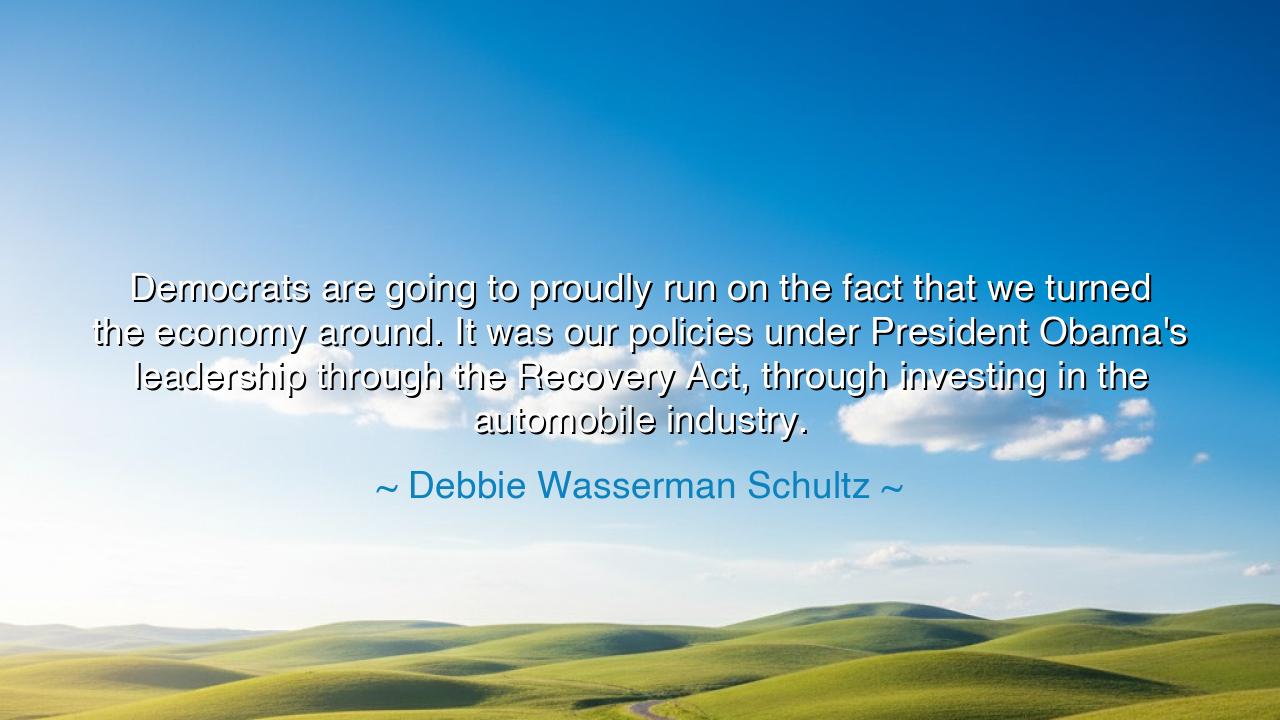
Democrats are going to proudly run on the fact that we turned the
Democrats are going to proudly run on the fact that we turned the economy around. It was our policies under President Obama's leadership through the Recovery Act, through investing in the automobile industry.






The words of Debbie Wasserman Schultz—“Democrats are going to proudly run on the fact that we turned the economy around. It was our policies under President Obama's leadership through the Recovery Act, through investing in the automobile industry”—speak not merely of politics, but of the eternal struggle between despair and renewal. They are the words of one who looks back upon a time of darkness and declares that through unity, vision, and perseverance, the storm was weathered and the dawn reclaimed. Beneath their political surface lies a universal truth: that leadership, when guided by conviction and courage, can rescue nations from ruin and rekindle the spirit of hope.
To understand her meaning, one must recall the origin of these words. They were spoken in the aftermath of the Great Recession—a time when the foundations of the global economy trembled and the faith of millions faltered. Factories closed, homes were lost, and workers who had built the prosperity of generations found themselves adrift in uncertainty. America, the land of endless possibility, stood at a precipice. Yet from this darkness arose a call to action, and under President Barack Obama’s leadership, measures were taken not to preserve comfort, but to restore the heartbeat of a wounded nation. The Recovery Act, with its sweeping investments in infrastructure, clean energy, education, and jobs, was the instrument through which hope was rekindled.
The automobile industry, once the proud symbol of American ingenuity, had been brought to its knees. Its decline was more than economic—it was cultural, a wound to the identity of a people who had long taken pride in building with their hands what the world admired. But rather than allow this pillar to crumble, the government intervened—not to replace enterprise with control, but to preserve a cornerstone of national strength. Through calculated support and visionary guidance, an industry that had teetered on the edge of extinction was reborn. Factories reopened. Families regained their dignity. And once again, the roads of America carried not only cars, but confidence.
Wasserman Schultz’s words, then, are not the boast of a politician, but the affirmation of a principle: that leadership in times of crisis is not measured by words, but by the courage to act. The Recovery Act was not merely an economic policy—it was an act of faith in the people, an investment in the potential that lies dormant in every society when fear clouds its vision. Through collaboration, innovation, and sacrifice, the nation began to rise again. Such moments remind us that recovery, whether of a nation or a soul, is never instant; it is the slow rekindling of light through the ashes of adversity.
History is rich with parallels to this truth. When Franklin D. Roosevelt took office in 1933 amidst the Great Depression, he faced a nation paralyzed by fear and despair. His New Deal programs, like Obama’s Recovery Act, were built upon the belief that government must serve not as a distant ruler, but as a partner in the rebuilding of the people’s strength. It was not simply about dollars and policies—it was about restoring faith in collective action, the conviction that no challenge is too great when a society works together toward a common good. In this lineage of renewal, Wasserman Schultz’s statement finds its rightful place: as a continuation of that great American tradition of rising again.
Her words also echo an ancient truth known to philosophers and prophets alike: that adversity reveals the worth of leadership. It is easy to rule in prosperity, but the true test of vision comes when all seems lost. Just as a physician’s skill is proven not in the healthy, but in the sick, so too is a leader’s strength proven in the crucible of crisis. The turning of the economy, as she describes, is not merely a statistic—it is the revival of human spirit, the restoration of purpose, and the affirmation that progress, though fragile, can always be rebuilt by the hands of the resolute.
The lesson that emerges from her reflection transcends party and nation. It is a reminder that when faced with collapse—whether economic, moral, or personal—one must not succumb to despair, but must act with courage, cooperation, and vision. Progress requires patience; recovery demands faith. Just as nations must invest in their industries and workers, so must individuals invest in their principles and their communities. No civilization, no person, is beyond redemption if they are willing to rebuild with integrity and perseverance.
Thus, let the words of Debbie Wasserman Schultz be heard not as a partisan declaration, but as a timeless teaching. For in every age there will come a moment when the world falters, when fear grips the heart and cynicism whispers that all is lost. But in that moment, leaders must arise—those who see beyond despair, who act not for power but for purpose, who understand that true recovery begins not in policy alone, but in the unbreakable will of a people determined to begin anew. And as long as there are such leaders, the light of renewal will never die.






AAdministratorAdministrator
Welcome, honored guests. Please leave a comment, we will respond soon